The Catholic Church proclaims that human life is sacred, made in the image and likeness of God. Our belief is the sanctity of human life and the inherent dignity of the human person is the foundation for all the principles of our social teaching.
The Call to Family, Community and Participation
The Catholic tradition proclaims that the person is not only sacred but also social. The God-given institutions of marriage and the family are the basic cell of society.
Human Rights and Responsibilities
The Church teaches that every person has a fundamental right to life and a right to those things required for human dignity: food, shelter, health care, education, employment. But corresponding to these rights are duties and responsibilities-to one another, to our families and to the larger society.
Special Concern for the Poor and Vulnerable
In today's society, there are many who are vulnerable: the long-term unemployed, the unborn child at risk of abortion, the poor single mother without child care, and the toddler threatened by abuse, the person living with AIDS or HIV. This teaching compels us to work with government to ensure that adequate funding and services are available to these especially vulnerable populations.
The Dignity of Work and Rights of Workers
If the dignity of work is to be protected, then the basic rights of workers, owners and managers must be respected - the right to productive work, to decent and fair wages, to organize and bargain collectively, to economic initiative, and to ownership and private property.
Solidarity
In the Catholic tradition, Christians have a moral responsibility to commit ourselves to the common good at all levels: in local communities, in our state and our nation, and in the community of nations. We are our brother' and sister' keepers, wherever they may live.
Care for God's Creation
The goods on the earth are gifts from God. We have a responsibility to care for these goods as stewards and trustees, not as mere
consumers and users.

EXIT
